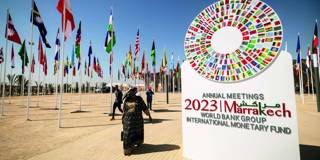Even though the world economy remains beset by challenges, multilateral cooperation appears to be in decline. But by working together to de-escalate geopolitical tensions, prevent technological fragmentation, and mitigate the effects of climate change, the international community could lay the groundwork for a more hopeful future.
JAKARTA – Global leadership was woefully absent in the wake of the COVID-19 crisis, which left no country unscathed. In 2021, I noted that the shape and pace of the post-pandemic economic recovery largely depended on multilateral cooperation. That remains true today, as the global economy, which has yet to bounce back fully from the pandemic, faces a new source of risk: proliferating geopolitical conflicts. Over the last two years, the war in Ukraine, the Israel-Hamas war, and seven military coups in Sub-Saharan Africa have increased fragility and have displaced huge numbers of people.

JAKARTA – Global leadership was woefully absent in the wake of the COVID-19 crisis, which left no country unscathed. In 2021, I noted that the shape and pace of the post-pandemic economic recovery largely depended on multilateral cooperation. That remains true today, as the global economy, which has yet to bounce back fully from the pandemic, faces a new source of risk: proliferating geopolitical conflicts. Over the last two years, the war in Ukraine, the Israel-Hamas war, and seven military coups in Sub-Saharan Africa have increased fragility and have displaced huge numbers of people.